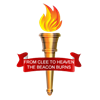Challenge in EYFS maths
“The world is a mathematical place. For young children who are naturally curious there are shapes, numbers, moving objects and patterns to behold, things to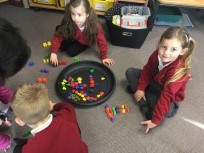 count and investigations to be undertaken. It is a creative, challenging and wonderous way of looking at life and exploring the world. Maths is an inherent part of being human. Framing the world through maths helps us make sense of what is happening and how it affects us’.
count and investigations to be undertaken. It is a creative, challenging and wonderous way of looking at life and exploring the world. Maths is an inherent part of being human. Framing the world through maths helps us make sense of what is happening and how it affects us’.
J Robertson 2017
How we challenge our Reception Pupils in Maths
Mastery in Math
At CHCA we follow the White Rose EYFS Scheme of learning which creates a progression of small steps in learning – including the teaching of specific maths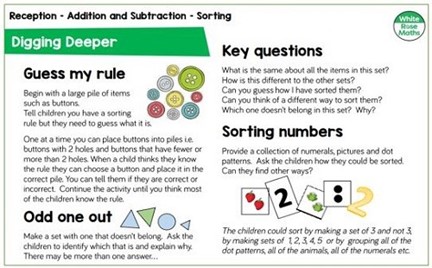 concepts and ways in which to enhance provision to support teaching such as key questions for adults to unpick children’s understanding and enable them to move forward with their learning. Each block of learning contains a ‘Digging Deeper’ page with ideas of activities that will challenge children further and deepen their understanding.
concepts and ways in which to enhance provision to support teaching such as key questions for adults to unpick children’s understanding and enable them to move forward with their learning. Each block of learning contains a ‘Digging Deeper’ page with ideas of activities that will challenge children further and deepen their understanding.
We challenge all pupils to use mathematical vocabulary accurately and explain their reasoning.
NCETM Mastering Maths
In addition to White Rose, children in Reception also have daily mastering maths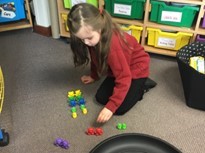 sessions. Through this, we aim to secure the foundations for good number sense ready for Reception pupils to continue into KS1. The aim over time is that children will leave KS1 with fluency in calculation and a confidence and flexibility with number.
sessions. Through this, we aim to secure the foundations for good number sense ready for Reception pupils to continue into KS1. The aim over time is that children will leave KS1 with fluency in calculation and a confidence and flexibility with number.
Tens Frames
In Year R, tens frames are used as a really simple framework for children to develop lots of different maths skills, including counting, adding, number bonds, patterns, creating arrays, subitising, etc. This builds upon the use of five frames in the Nursery class. There are so many different ways in which tens frames can be used to challenge EYFS pupils. Click here for some examples.
Pupils take part in daily ‘morning maths’ activities exploring the calendar and register numbers using tens frames.
Maths stories
Maths stories are used in a number of ways in the EYFS.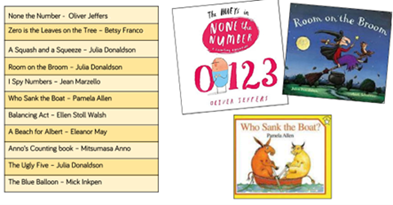
1. Stories might be used at the beginning of a lesson or unit to introduce a new mathematical concept.
2. They might be used at the end of a lesson/unit to reinforce previous learning.
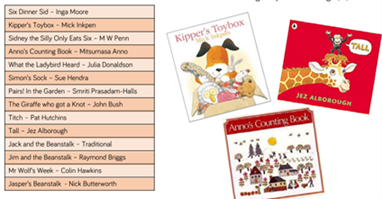
3. Stories are used as an engaging 'hook' to enthuse pupils in their learning.
At CHCA, we use the White Rose story recommendations, as well as other books, to model early maths skills through various real life (or virtual) situations.
Child Initiated Learning:Maths is everywhere
‘All children can be successful with mathematics, provided that they have opportunities to explore mathematical ideas in ways that make personal sense to them and opportunities to develop mathematical concepts and understanding. Children need to know that practitioners are interested in their thinking, respect their ideas, are sensitive to their feelings and value their contributions.’
DCSF (2008)
Although teacher led activities are important in the EYFS, enhancing our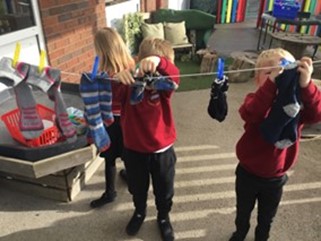 provision to support maths ‘play’ is also important to enable pupils to follow their own interests. Our EYFS practitioners can then use this as a starting point to develop their mathematical thinking and build mathematical opportunities for them. Through effective questioning, children’s learning can be moved forward and their thinking challenged through play.
provision to support maths ‘play’ is also important to enable pupils to follow their own interests. Our EYFS practitioners can then use this as a starting point to develop their mathematical thinking and build mathematical opportunities for them. Through effective questioning, children’s learning can be moved forward and their thinking challenged through play.
Children have the opportunity to work with the maths challenge table as part of their continuous provision. There are also maths activities integrated into other areas of the classroom and outdoor area and adults in class are ready to challenge pupils to apply and develop their mathematical thinking skills.
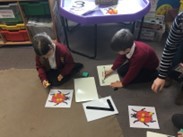
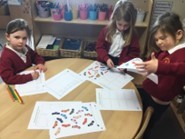
Number formation
Pushing numbers – click here for support
Pulling numbers – click here for support
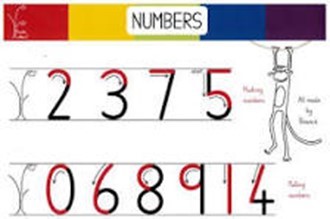
Useful Resources for Parents
Below are a number of resources for parents which will challenge your child in their mathematical thinking. Completed activities can be shared with your child’s class teacher on EYLOG.
